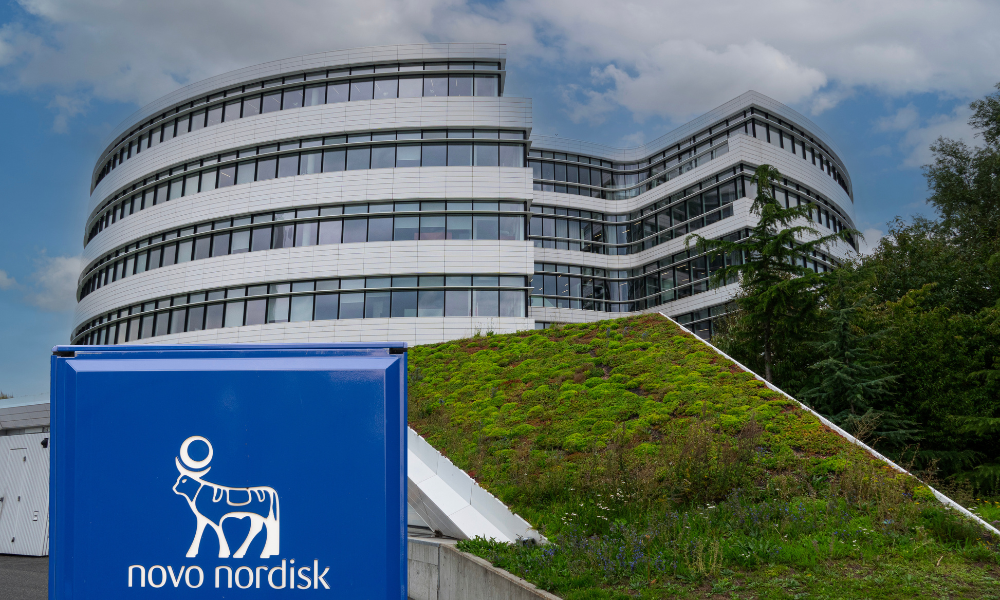Shares fall 70% after forecast cut, CEO change and Trump's demand to lower US drug prices

Novo Nordisk’s record-breaking share collapse wiped out nearly US$100bn in market value last week, raising immediate concerns about competition in the global obesity drug market and long-term consequences for institutional portfolios exposed to the Danish drugmaker.
According to Sydbank, Danish households lost US$5.8bn in regular stock portfolios on Tuesday alone, an amount equal to nearly 3 percent of the country’s annual private consumption.
As reported by Bloomberg, the impact extends well beyond retail investors—Novo Nordisk had been Europe’s most valuable listed firm just a year ago, worth around US$650bn.
Its current market capitalisation has dropped to US$206bn, with shares now back to 2022 levels.
The stock plunge followed a series of events that began Tuesday, when Novo cut its 2025 sales growth forecast and appointed insider Maziar Mike Doustdar as chief executive.
The company blamed the downgrade on rising competition in the US—its largest market—including compounded versions of Wegovy and the rise of rival products like Eli Lilly’s Zepbound.
According to Bloomberg, Novo’s shares dropped 23 percent on the day—its worst single-day fall on record—and have fallen 70 percent from last year’s peak.
The slide continued after former US President Donald Trump sent letters to 17 major pharmaceutical companies on Thursday, including Novo Nordisk, demanding lower drug prices in the US.
Nordnet analyst Per Hansen said, “Trump doesn’t have the mandate to tell Novo Nordisk how to price their products in the US, but investors are just panicking about the risk of another downgrade.”
He added that the current correction reflects “a repricing of the obesity market,” as well as the perceived risks of US drug pricing and political interference.
While Novo’s recent challenges recall its 2016 slump, Barclays analyst Emily Field warned that this time “won’t be an easy fix.”
Field downgraded the stock to equal-weight from overweight, writing that its drug development pipeline now lags behind competitors and the company is “having a hard time competing with cheaper, copycat versions of its medicines.”
HSBC analyst Rajesh Kumar also cut his rating, stating, “We got our call on Novo wrong.”
His note acknowledged that expectations around the FDA’s compounding ban restoring Novo’s market share had not materialised.
The broader impact of Novo’s struggles has raised red flags in Denmark’s financial and political circles.
As per Bloomberg, the company accounted for half of all private-sector job growth in Denmark between early 2023 and 2024 and directly employs more than 30,000 people.
The firm’s downturn has already triggered export forecast downgrades from the state’s financial watchdog and raised questions about future GDP performance.
Danske Bank chief economist Las Olsen said, “Lower growth in Novo means lower GDP growth in Denmark, it’s as simple as that.”
He added that if Novo were to flatline, Denmark would likely fall out of the group of Europe’s fastest-growing economies.
In Kalundborg, home to Novo’s main production facilities, the firm’s rapid expansion had lowered unemployment and spurred housing and infrastructure investment.
Any cuts, as Doustdar has hinted, could reverberate through the town’s suppliers, universities, and local businesses.
Despite its downturn, Novo still ranks as one of the top-performing major pharmaceutical stocks over the past five years.
However, as reported by Bloomberg, its fast rise—more than tripling in share value before its recent fall—may have left it overexposed to investor expectations.
Novo’s governance structure, with the Novo Nordisk Foundation holding a majority of voting rights but minority economic interest, limits the company’s vulnerability to activist pressure or takeovers.
Bloomberg noted that this structure may have slowed strategic diversification, such as using its high share value to acquire biotech assets before the downturn.
The company defended its pricing stance amid political scrutiny, stating in an emailed response that “the US healthcare system is complex, but Novo Nordisk will continue to work to find solutions that help people access the medicines they need at affordable prices.”
Novo Nordisk is set to report its second-quarter results on Wednesday.



